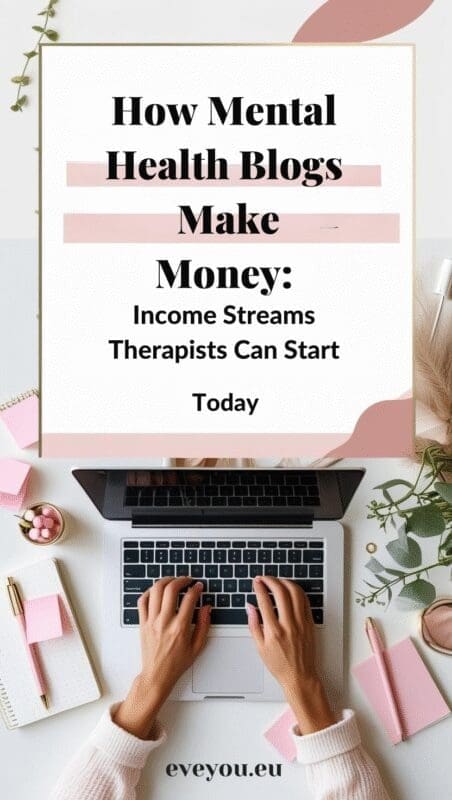As a mental health professional, I’ve personally experienced the increased demand for our expertise—especially post-pandemic. Like many colleagues, I faced rising workloads and emotional exhaustion, which led me to explore blogging as a creative and potentially profitable outlet. However, when I began, I quickly realized I lacked the strategies and knowledge needed to transform my passion into a reliable source of passive income. Is it truly realistic to make money from a mental health blog in 2025? Here’s my journey, practical insights, and inspiring real-world examples.
Why Therapists Are Turning to Blogging
Burnout among therapists is at an all-time high due to increasing demand and heavy caseloads. Blogging offers a meaningful alternative. For me, as a full-time school counselor and mother of small children, exhaustion was constant. I needed hobbies that could help me unwind after long days while allowing me to research topics of personal interest, such as nervous system regulation and alternative healing modalities beyond traditional psychotherapy.
Blogging quickly became therapeutic for me. It allowed me to process my experiences, connect with other mental health professionals, and rekindle my passion for mental health advocacy. Given the global demand for trustworthy mental health information, my blog soon attracted a modest yet dedicated audience.
Realistic Income Examples from Mental Health Blogs
When starting my blog, I struggled to find accurate financial expectations. To provide clarity, I thoroughly researched several successful blogs in the mental health space. Here’s a detailed look at some realistic and inspiring examples:
Tracking Happiness
Tracking Happiness is a blog founded by Hugo, focused on personal growth, journaling, and happiness tracking. Hugo started this blog as a passion project, initially earning minimal income. However, through consistent high-quality content and SEO optimization, he steadily increased traffic and earnings. Today, this blog generates around $3,000 per month, mainly from display ads and digital products such as online courses and downloadable resources. Hugo’s journey underscores the importance of patience, persistence, and strategic monetization.
Coping Skills for Kids
Janine Halloran, a licensed therapist, created Coping Skills for Kids to provide practical tools for children’s emotional regulation. Her blog quickly gained popularity among parents, teachers, and therapists due to her expertise and relatable content. By offering digital and physical resources—such as printable worksheets, coping strategies books, card decks, and courses—Janine’s blog now earns approximately $20,000 per month. Her success demonstrates how professional expertise and targeted, practical resources can significantly amplify blog earnings.
Smaller Mental Health Blogs
Many smaller or newer blogs typically earn between $500–$1,500 monthly after consistent work over one or two years. These blogs often start with basic monetization methods, such as affiliate marketing and display ads, slowly introducing digital products as they grow their audience. While these blogs may not reach immediate high revenue, they provide supplementary income and valuable experience, potentially leading to more significant income over time.
Key Insights from These Examples
These real-world cases clarify achievable goals, emphasizing patience, consistency, and strategic monetization. They also highlight essential points:
- Diversification: Successful bloggers utilize multiple income streams, reducing dependency on a single revenue source.
- Expertise and Quality Content: Blogs that leverage professional knowledge and offer genuinely valuable content attract loyal audiences willing to invest in paid products.
- Scalable Products: Offering digital products, courses, and downloadable resources significantly boosts income potential.
- Long-term Commitment: Most successful blogs didn’t achieve substantial income overnight. Consistent effort over months or years was crucial to their financial success.
These insights gave me a clearer vision of realistic income expectations, guiding my strategy for developing and monetizing my own mental health blog effectively.
How Do Mental Health Blogs Make Money?
From my experience and research, successful mental health bloggers typically use several income streams:
- Display Ads: Starting with Google AdSense, later moving to higher-paying ad networks as traffic grows.
- Affiliate Marketing: Recommending valuable products or services such as books and online therapy platforms to earn commissions.
- Digital Products: Creating and selling e-books, printable therapy worksheets, guided meditations, or online courses based on professional expertise.
- Sponsored Posts: Partnering with mental health-related brands for paid sponsored content.
The crucial insight I wish I’d known sooner is that multiple income streams significantly increase overall stability.
How Long Does It Take to Earn Money from a Blog?
When I started blogging, I underestimated the time needed to generate meaningful income. Based on personal experience and industry trends, here’s a realistic timeline:
Year 2: Signific
Months 1–3: Blog setup, minimal earnings.
Months 4–6: Initial organic traffic, small earnings ($20–$100 monthly).
Months 6–12: Steady growth, earnings reaching $200–$500 monthly.
How Do Mental Health Blogs Make Money?
From my experience and research, successful mental health bloggers typically use several income streams:
- Display Ads: Starting with Google AdSense, later moving to higher-paying ad networks as traffic grows.
- Affiliate Marketing: Recommending valuable products or services such as books and online therapy platforms to earn commissions.
- Digital Products: Creating and selling e-books, printable therapy worksheets, guided meditations, or online courses based on professional expertise.
- Sponsored Posts: Partnering with mental health-related brands for paid sponsored content.
The crucial insight I wish I’d known sooner is that multiple income streams significantly increase overall stability.
How Long Does It Take to Earn Money from a Blog?
When I started blogging, I underestimated the time needed to generate meaningful income. Based on personal experience and industry trends, here’s a realistic timeline:
- Months 1–3: Blog setup, minimal earnings.
- Months 4–6: Initial organic traffic, small earnings ($20–$100 monthly).
- Months 6–12: Steady growth, earnings reaching $200–$500 monthly.
- Year 2: Significant growth phase, with earnings potentially reaching $500–$2,500 monthly.
- Year 3 and beyond: With ongoing effort, monthly earnings of $3,000–$10,000 or more become achievable.
Patience and persistence were critical lessons I learned throughout this journey.
Essential Skills and Tools for Starting a Blog
Initially enthusiastic, I soon realized I needed specific skills for blog growth:
- Clear Writing: Translating professional insights into engaging, accessible content.
- Website Management: Using beginner-friendly platforms like WordPress.
- SEO Knowledge: Optimizing content for search engines to attract organic visitors.
- Social Media Marketing: Utilizing platforms like Pinterest, Instagram, and email marketing tools (Mailchimp or ConvertKit) to reach readers.
Tools such as Canva, Yoast SEO, and Google Analytics greatly simplified my learning process.
Blogging as Self-Care and Impactful Work
An unexpected benefit was how blogging reduced my professional burnout. It became a creative outlet to explore topics I genuinely cared about and connected me to a global audience. Receiving positive feedback about my blog’s impact was deeply rewarding. Additionally, blogging allowed me to indulge my love for beautiful office decor – searching for the perfect armchair for my workspace :))
Practical Steps to Launch Your Blog
Reflecting on my journey, here is the practical roadmap I wish I’d had:
- Choose Your Niche: Clearly define your blog’s focus, such as anxiety management or therapist self-care.
- Set Up Your Website: Use beginner-friendly platforms like WordPress, select a professional design, and create essential pages (About, Contact, Disclaimer).
- Consistent Content Creation: Regularly publish valuable and engaging content to build credibility and attract readers.
- Monetize Gradually: Start with straightforward methods like ads and affiliates, then introduce digital products and sponsored content over time.
- Promote and Engage: Actively share your content on social media, join relevant online communities, and genuinely interact with your audience.
Is Mental Health Blogging Worth It?
From personal experience and thorough research, I confidently say mental health blogging in 2025 remains viable and rewarding. While the financial gains are significant, the emotional fulfillment and professional satisfaction are equally powerful. If you’re committed to investing the necessary time, learning new skills, and remaining patient, your mental health blog can evolve into both a meaningful personal project and a profitable venture. Additionally, becoming visible on platforms like Instagram or Pinterest can further grow your personal brand and expand your reach significantly.
Are you thinking about starting your own mental health blog, or do you already have one? I’d love to hear your story! Share your experiences, goals, or questions in the comments below—let’s inspire and support each other on this rewarding blogging journey!

About the Author
Hi, I’m Eve, a former school counselor with a master’s degree in School Psychology and a passionate advocate for children and families navigating sensory challenges. As a mom of children with sensory sensitivities, I deeply understand the journey special-needs parents face, and I dedicate myself to researching and sharing practical solutions to help children thrive and feel comfortable in their bodies. My goal is also to empower counselors, therapists, and psychologists with creative strategies and supportive resources to enrich their everyday practice. When I’m not writing or exploring new therapeutic approaches, you’ll find me spending quality time with my family and continually seeking inspiration from everyday moments.




